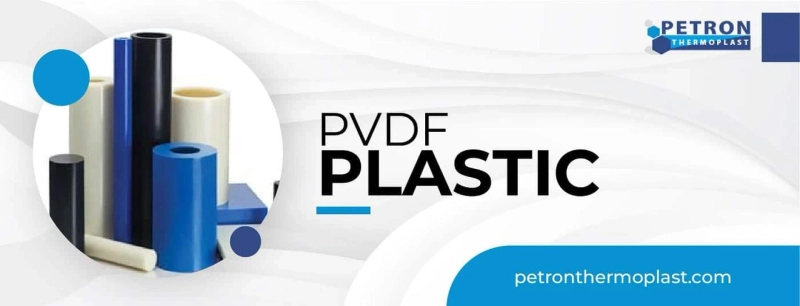Polyvinylidene fluoride (PVDF) is a high-performance thermoplastic known for its remarkable chemical resistance, mechanical strength, and versatility. As a member of the fluoropolymer family, PVDF offers unique properties that make it suitable for a wide range of demanding applications across various industries. This article explores the industrial applications, benefits, and specific use cases of PVDF Plastic, highlighting its critical role in modern industrial processes.
Industrial Applications of PVDF Plastic
PVDF plastic is utilized in numerous industries due to its robust performance characteristics:
- Chemical Processing:
- PVDF is highly resistant to corrosive chemicals, making it ideal for use in piping systems, storage tanks, and process equipment in chemical plants.
- Water Treatment:
- Its resistance to chlorine and other disinfectants makes PVDF an excellent choice for components in potable water systems, wastewater treatment facilities, and desalination plants.
- Electronics and Semiconductor:
- PVDF’s purity and electrical properties are essential for manufacturing components in the electronics and semiconductor industries, where contamination control is crucial.
- Aerospace and Defense:
- PVDF is used in aerospace applications for its high strength-to-weight ratio and resistance to extreme environmental conditions.
- Food and Beverage:
- PVDF complies with FDA regulations, making it suitable for use in food processing and packaging, where it ensures product safety and hygiene.
- Medical and Pharmaceutical:
- In the medical field, PVDF is used for its biocompatibility and chemical resistance, particularly in medical devices and pharmaceutical equipment.
Benefits of PVDF Plastic
PVDF plastic offers several key advantages that make it a preferred choice in various industrial applications:
- Chemical Resistance: PVDF can withstand a wide range of aggressive chemicals, including acids, bases, and organic solvents, without degrading.
- High Thermal Stability: It retains its mechanical properties across a wide temperature range, making it suitable for high-temperature applications.
- Mechanical Strength: PVDF offers excellent mechanical properties, including high tensile strength and impact resistance.
- UV and Radiation Resistance: PVDF is resistant to UV radiation and can withstand long-term exposure to sunlight and radiation without significant degradation.
- Purity: Its high purity ensures that PVDF does not contaminate sensitive processes or products, which is crucial in the semiconductor and pharmaceutical industries.
- Easy Processing: PVDF can be easily fabricated into various forms, including films, sheets, pipes, and coatings, facilitating its use in diverse applications.
Use Case in Industry
A notable use case of PVDF plastic is in the semiconductor industry, where ultra-pure water (UPW) systems are essential for manufacturing processes. PVDF’s high purity, chemical resistance, and excellent mechanical properties make it the material of choice for piping systems, fittings, and storage tanks in UPW applications. These systems require materials that do not leach contaminants and can withstand the aggressive chemicals used in semiconductor fabrication. PVDF ensures the integrity and cleanliness of the UPW systems, thereby supporting the production of high-quality semiconductor devices.
Conclusion
PVDF plastic is an indispensable material in various industrial applications due to its exceptional chemical resistance, mechanical strength, and versatility. Its ability to perform reliably under harsh conditions makes it a valuable asset in industries ranging from chemical processing and water treatment to electronics, aerospace, and medical devices. As industries continue to advance, the demand for high-performance materials like PVDF will grow, driving innovation and enhancing the efficiency and reliability of industrial processes.
FAQs
1. What is PVDF plastic?
PVDF (Polyvinylidene Fluoride) is a high-performance thermoplastic known for its excellent chemical resistance, mechanical strength, and thermal stability.
2. Which industries commonly use PVDF plastic?
PVDF is widely used in chemical processing, water treatment, electronics, aerospace, food and beverage, and medical and pharmaceutical industries.
3. Why is PVDF preferred in chemical processing plants?
PVDF is highly resistant to a wide range of corrosive chemicals, making it ideal for use in piping systems, storage tanks, and process equipment in chemical plants.
4. Can PVDF plastic withstand high temperatures?
Yes, PVDF retains its mechanical properties across a wide temperature range, making it suitable for high-temperature applications.
5. Is PVDF plastic safe for use in food processing?
Yes, PVDF complies with FDA regulations, ensuring it is safe for use in food processing and packaging applications.
6. What makes PVDF suitable for semiconductor manufacturing?
PVDF’s high purity, chemical resistance, and excellent mechanical properties make it ideal for use in ultra-pure water systems and other critical components in semiconductor manufacturing.
7. How does PVDF perform in outdoor applications?
PVDF is resistant to UV radiation and can withstand long-term exposure to sunlight and radiation without significant degradation, making it suitable for outdoor applications.



